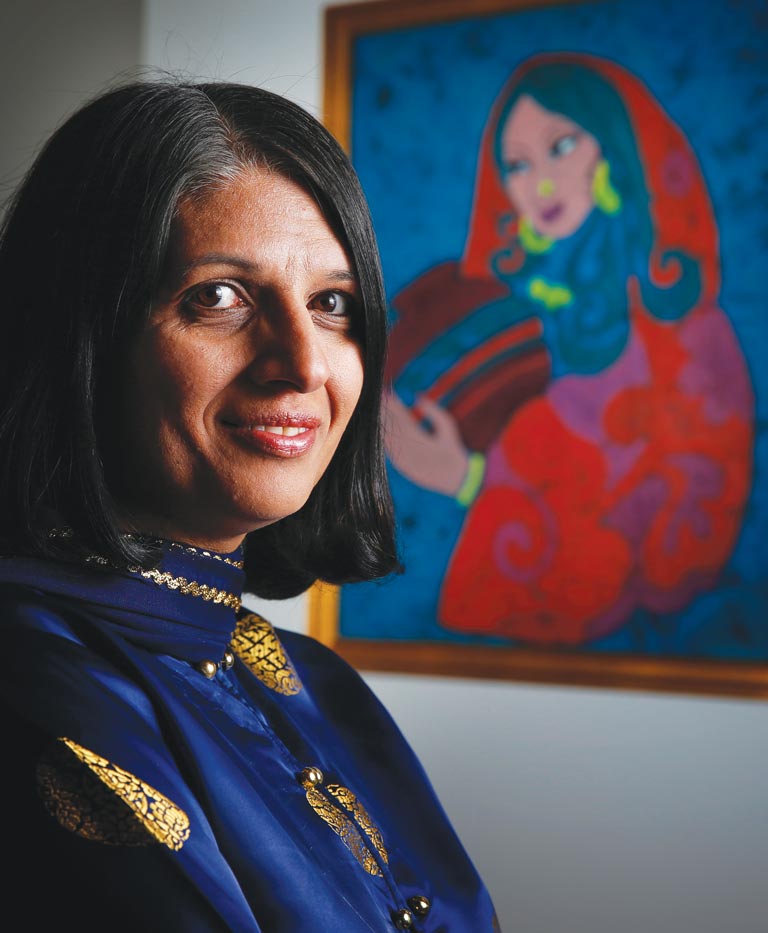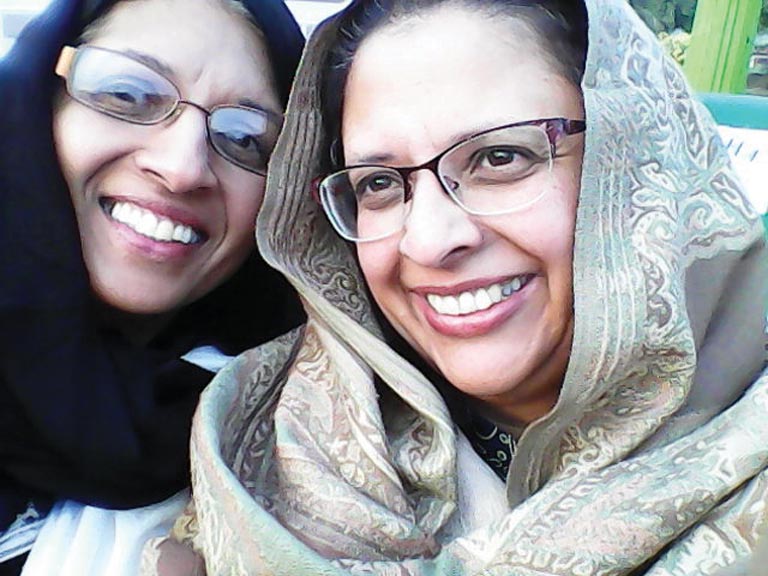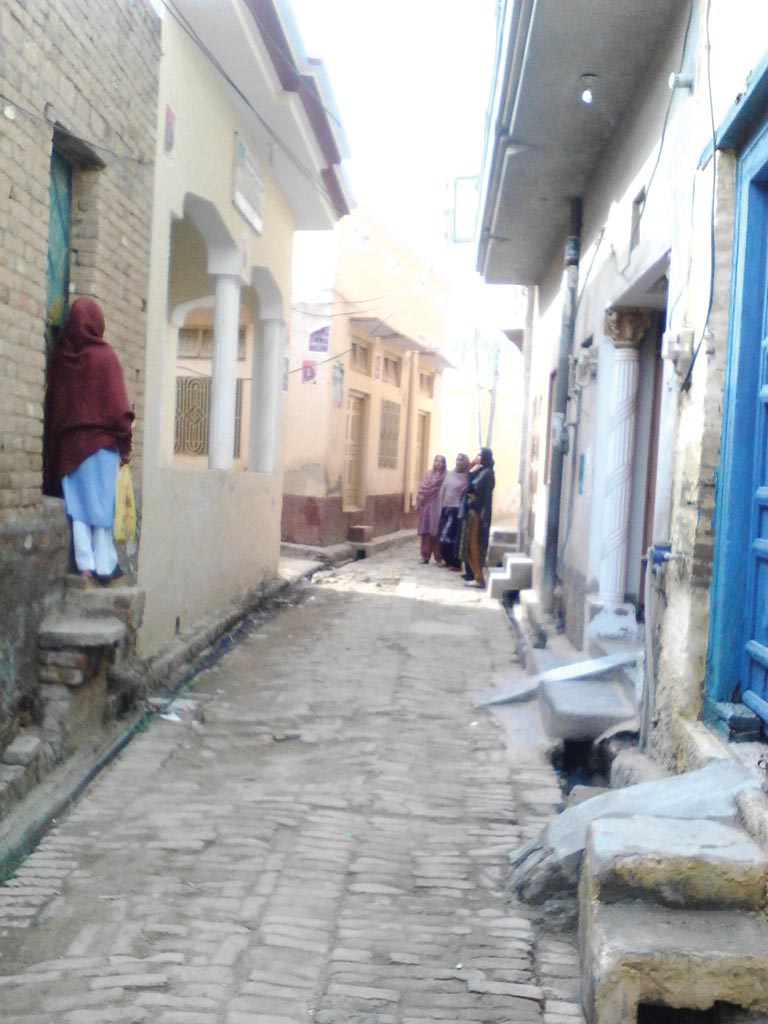Bringing Hope to Young Women in Pakistan



How do you motivate students to reach their goals when the hurdles they face feel insurmountable?
LCCC education instructor Dr. Arshi Rizwani-Nisley sought insight into this challenging question.
Dr. Arshi Rizwani-Nisley (known simply as "Arshi" on campus), has not only taught at LCCC for 12 years, but she also works with students through the honor society Phi Theta Kappa. As the chapter's advisor, Arshi applied for and received the prestigious Phi Theta Kappa Mosal Award, which provides financial support for projects that encourage professional development beyond earned degrees.
The Project
Arshi's project proposed that she travel to Pakistan to work with students in the village of Bhaun. Her uncle founded the Institute for Literacy Movement (ILM) there in 2007 specifically for girls, ages 14-18, who want to improve their literacy and develop job skills. Her hope was to learn their stories, build their confidence, and improve their English, all of which hopefully will help them find employment.
"Female students in Pakistan face so many obstacles in attending school," Arshi explained. "Some don't have the support of their families. Others face physical dangers from radical, militant groups just for the chance at an education. I want to talk to these girls about their struggles and their motivations for going to school. I want to share their stories with my students here in hopes of inspiring them to complete their education."
Arshi was born in Pakistan. Had her path not diverted to the United States when she was 10 years old, the challenges these girls face might be front and center in her life today. With this project, she began her first journey to Pakistan in more than 25 years.
The Trip
Arshi faced cultural and safety challenges traveling in the area. To assist with this, she was accompanied by her sister Rakhshi Hamid, who also works at LCCC as the director of the Center for Secondary Students and served as her sister's recorder for this trip. They stayed with a local family throughout the trip and even had to hire a driver.
"Arshi's work also connected us to our roots. The school is actually built on the home of our great-grandfather," Rakhshi said.
At the ILM, Arshi met young girls learning to read and write in Urdu, the area's primary language. She saw the students learning job skills on the institute's six sewing machines and three computers. And she learned their stories.
The girls are responsible for caring for siblings, parents or both. Once the girls are married, their husbands often don't want them to continue school, and instead they are expected to maintain the upkeep of the home and family. As the new bride, she must move into her mother-in-law's house and take care of that entire household.
"And I knew that. But seeing these girls live that way...," Arshi trailed off, considering this.
"It's difficult."
While there, she interviewed 36 girls. The story of Bushra, one of the students, is indicative of the challenges and opportunities many of these girls face.
Bushra is 16 years old and the eldest of five children. After her father's death, her mother began cleaning houses in the village to support the family. At that time, Bushra stopped attending school to take care of her siblings full time. She had only completed the sixth grade.
When her mother learned about ILM, she encouraged Bushra to go a couple of times each week to continue her schooling and learn to sew. Bushra worked hard, taking home extra work and studying in the evenings and on days she couldn't attend. She even sewed clothes for neighbors to earn extra money. Working on her computer certificate, she soon will be ready to take the metric exam, which is a set of national assessments similar to the GED.
Asked why she comes to school, Bushra said, "I want to help my mom. I want to get a job with good pay so she doesn't have to clean houses anymore." She hopes to leave the village and go to college to become a nurse, but added, "I know it is difficult and expensive, so maybe my computer [skills] will help me get a job to help my family."
The last day Arshi spent at the school was an emotional one. She reflected on what her life would be like if she hadn't left Pakistan.
"I would be their teacher. I would have loved helping them, helping them find better lives," Arshi said. "But the selfish part of me is grateful that I can get in my car any time I want, drive anywhere I want, buy anything I want, and dress any way I want.
In many ways, those freedoms were gone for her while she was there.
The Outcome
Arshi knows that everyone's experience and background are different, that many students here face challenges that seem insurmountable. She also knows that there are resources for students in the United States that simply aren't possible for the students in Pakistan. "A lot of women, a lot of children are struggling to learn, and they want that opportunity," Arshi reflects.
It's easy to forget the luxury of options that many have here. Knowing that, the LCCC campus is starting to feel the impact of Arshi's project.
"Her work highlights the value of global educational opportunities for students and faculty," said Terry Harper, the interim vice president of academic affairs at LCCC. "What she brought back expands the students' understanding of the universal human condition."
"Arshi's research was wonderful on several fronts," Rakhshi said. "It showcased education of women, boosting their self-esteem and the communities' perception of the work they do. This work is a reinforcement to our commitment to education."
With all those positives, Arshi says she sometimes feels selfish by being here and not teaching in other areas of the world.
"What I can do is be the best teacher for my students here, so that I can know I'm making a difference in their lives," she contemplated. "Maybe I'm not making a big difference in that corner of the world, but maybe I can make one here."
It's safe to say she's made a tremendous difference in both places.
 LARAMIE COUNTYCOMMUNITY COLLEGE
LARAMIE COUNTYCOMMUNITY COLLEGE